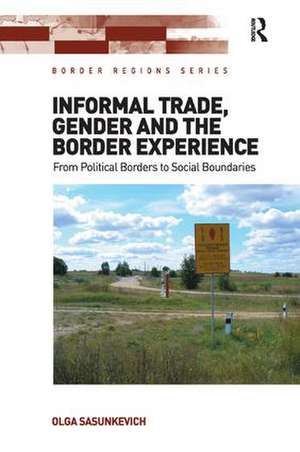Informal Trade, Gender and the Border Experience: From Political Borders to Social Boundaries: Border Regions Series
Autor Olga Sasunkevichen Limba Engleză Paperback – 12 feb 2018
| Toate formatele și edițiile | Preț | Express |
|---|---|---|
| Paperback (1) | 325.34 lei 6-8 săpt. | |
| Taylor & Francis – 12 feb 2018 | 325.34 lei 6-8 săpt. | |
| Hardback (1) | 766.31 lei 6-8 săpt. | |
| Taylor & Francis – 28 noi 2015 | 766.31 lei 6-8 săpt. |
Din seria Border Regions Series
-
 Preț: 348.51 lei
Preț: 348.51 lei - 14%
 Preț: 338.33 lei
Preț: 338.33 lei -
 Preț: 469.34 lei
Preț: 469.34 lei -
 Preț: 453.04 lei
Preț: 453.04 lei - 12%
 Preț: 298.61 lei
Preț: 298.61 lei - 12%
 Preț: 325.34 lei
Preț: 325.34 lei - 14%
 Preț: 301.33 lei
Preț: 301.33 lei - 14%
 Preț: 299.06 lei
Preț: 299.06 lei -
 Preț: 436.14 lei
Preț: 436.14 lei -
 Preț: 416.22 lei
Preț: 416.22 lei - 13%
 Preț: 305.32 lei
Preț: 305.32 lei - 13%
 Preț: 338.33 lei
Preț: 338.33 lei - 12%
 Preț: 325.34 lei
Preț: 325.34 lei - 16%
 Preț: 338.33 lei
Preț: 338.33 lei - 30%
 Preț: 768.30 lei
Preț: 768.30 lei - 31%
 Preț: 764.20 lei
Preț: 764.20 lei - 19%
 Preț: 258.89 lei
Preț: 258.89 lei -
 Preț: 389.66 lei
Preț: 389.66 lei -
 Preț: 385.71 lei
Preț: 385.71 lei -
 Preț: 386.77 lei
Preț: 386.77 lei - 19%
 Preț: 259.51 lei
Preț: 259.51 lei -
 Preț: 383.33 lei
Preț: 383.33 lei -
 Preț: 389.66 lei
Preț: 389.66 lei - 18%
 Preț: 943.31 lei
Preț: 943.31 lei
Preț: 325.34 lei
Preț vechi: 379.25 lei
-14% Nou
Puncte Express: 488
Preț estimativ în valută:
62.26€ • 66.57$ • 51.91£
62.26€ • 66.57$ • 51.91£
Carte tipărită la comandă
Livrare economică 17 aprilie-01 mai
Preluare comenzi: 021 569.72.76
Specificații
ISBN-13: 9781138546899
ISBN-10: 1138546895
Pagini: 220
Dimensiuni: 156 x 234 mm
Greutate: 0.45 kg
Ediția:1
Editura: Taylor & Francis
Colecția Routledge
Seria Border Regions Series
Locul publicării:Oxford, United Kingdom
ISBN-10: 1138546895
Pagini: 220
Dimensiuni: 156 x 234 mm
Greutate: 0.45 kg
Ediția:1
Editura: Taylor & Francis
Colecția Routledge
Seria Border Regions Series
Locul publicării:Oxford, United Kingdom
Public țintă
Postgraduate and UndergraduateCuprins
Contents: Introduction; Shuttle trade in Asmjany: contextualizing oral history research; Shuttle trade and borders in Asmjany before the disintegration of the USSR; The emergence of national borders, the flourishing of trade: shuttle trade in Asmjany in the early 1990s; Maturation of the border, professionalization of shuttle trade (1994-2007); Persistence of the border, disappearance of trade? Shuttle trade in Asmjany after Schengen (2007-2011); Shuttle trade and gender relations: a female world in a provincial border town; Conclusion; Appendix; Bibliography; Index.
Notă biografică
Olga Sasunkevich is a lecturer at the Department of Media and executive co-director of the Center for Gender Studies at the European Humanities University, Vilnius, Lithuania.
Recenzii
’This book allows us to enter into a new (micro) world to discover the hidden dynamics of the female informal economy, bringing about a so-far neglected gender perspective on post-socialist borders. It not only sheds light on why women resort to informal and cross-border trade and how this is determined by gender segregation of formal and informal labour markets but also, through its in-depth ethnography, allows us to appreciate to what extent these activities are embedded into women's daily life practices.’ Abel Polese, Tallinn University, Estonia ’Olga Sasunkevich has written a well-researched, theoretically grounded, and thorough book, which is a must-read for everyone who seeks to understand the changing nature of post-Cold War borders in Eastern Europe. This micro-study of shuttle trade in the small Belarusian town of AÅ¡mjany, based on oral history interviews and long-term participant observation, gives readers an enlightening glimpse into the recent history of the Belarusian-Lithuanian border from the collapse of the Soviet Union to the 2007 enlargement of the Schengen Area. Her book is feminist in the truest sense: it gives agency and human dignity to women involved in cross-border trade, demonstrating that what is at stake is not merely self-exploitation, but also personal empowerment.’ Tatiana Zhurzhenko, IWM - Institute for Human Sciences, Austria
Descriere
Detailing the history of a well-known phenomenon of post-socialism - cross-border petty trade and smuggling - as the history of a practice in daily life from a gendered perspective, this book considers how changes in these practices in a particular border region, between Belarus and Lithuania, have been accompanied, and to some extent provoked, by changes in the border regime. It looks at how the selective openness of the Belarus-Lithuania border worked during different periods over the last twenty years and how it influenced the involvement of different social groups in shuttle trade practices.
